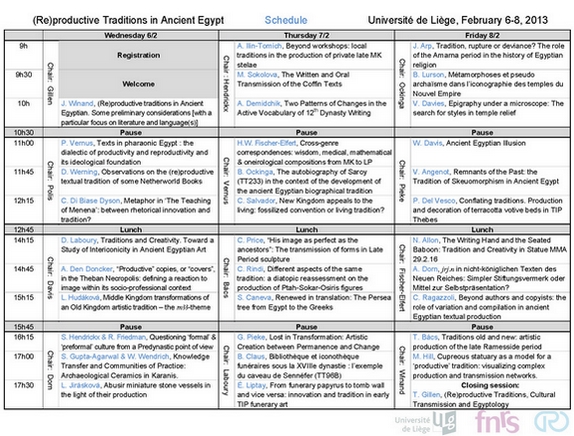Renseignements généraux
Actualités
Conférence "Les carrières d'albâtre égyptien à Hatnub : nouveaux textes issus d'un ancien site" (Université de Liège, 31 mai 2016)
Le professeur Roland Enmarch (Université de Liverpool) donnera une conférence sur les textes hiératiques d'Hatnub le 31 mai 2016 à l'Université de Liège (Salle Lumière). Pour plus de renseignements, contactez : g.lescuyer@ulg.ac.be , aurore.motte@ulg.ac.be ou nsojic@ulg.ac.be
Colloque international « Signes dans les textes : recherches sur les continuités et les ruptures des pratiques scribales en Égypte pharaonique, gréco-romaine et byzantine » / International Conference "Signs in Texts: Research on Continuities and Changes in Scribal Practices in Pharaonic, Græco-Roman and Byzantine Egypt"
(Université de Liège, 2-4 juin 2016)
[English version below]
Le service d’égyptologie et le CEDOPAL (http://www.cedopal.ulg.ac.be) sont heureux de vous annoncer l’organisation du colloque « Signes dans les textes : recherches sur les continuités et les ruptures des pratiques scribales dans l’Égypte pharaonique, gréco-romaine et byzantine », à l’Université de Liège, du 2 au 4 juin 2016, faisant suite au colloque intitulé « Signes dans les textes, textes sur les signes : érudition, lecture et écriture dans le monde gréco-romain », organisé dans notre université les 6 et 7 septembre 2013.
Alors que le colloque de 2013 était consacré aux textes grecs et latins d’Égypte et du reste du bassin méditerranéen, du Ier s. avant notre ère au IXe s. de notre ère, la réunion de 2016 vise, dans une perspective interdisciplinaire, à décrire la richesse de l’emploi des signes dans les écrits issus d’Égypte, depuis les débuts de la civilisation pharaonique jusqu’au XIIe s. de notre ère. L’ampleur de la période chronologique considérée permettra d’appréhender la variété des signes paratextuels utilisés, ainsi que de mettre en exergue les traditions et renouvellements dans des textes écrits au moyen de plusieurs systèmes graphiques (hiéroglyphiques, hiératique, démotique, grec, latin, copte et arabe) et sur différents supports (ostraca, papyrus, parchemins, pierres, tablettes de bois).
Pour de plus amples informations, vous pouvez vous adresser à :
n.carlig@ulg.ac.be
g.lescuyer@ulg.ac.be
aurore.motte@ulg.ac.be
nsojic@ulg.ac.be
-----
The department of Egyptology and the CEDOPAL (http://www.cedopal.ulg.ac.be) are very pleased to announce the congress "Signs in Texts: Research on Continuities and Changes in Scribal Practices in Pharaonic, Græco-Roman and Byzantine Egypt", in the wake of the conference entitled "Signes dans les textes, textes sur les signes : érudition, lecture et écriture dans le monde gréco-romain," which took place at the University of Liège on September 6th-7th, 2013.
While the conference held in 2013 was mostly dedicated to Greek and Latin texts from the whole Mediterranean area, dating from the 1st century BC down to the 9th century AD, the 2016 meeting focuses on documents from Egypt from the beginning of the pharaonic civilization down to the 12th century AD. This broader chronological span allows not only to describe the variety of paratextual signs used by the scriptors, but also to highlight traditions and changes within (and across) various writing systems (hieroglyphic, hieratic, demotic, Greek, Latin, Coptic, and Arabic) and writing materials (ostraca, papyri, parchments, stones, tablets).
For further information, please contact:
n.carlig@ulg.ac.be
g.lescuyer@ulg.ac.be
aurore.motte@ulg.ac.be
nsojic@ulg.ac.be
Colloque international/International Conference "Temps et espace en Égypte ancienne - Time and Space in Ancient Egypt" (Louvain-la-Neuve, 9-11 juin 2016)
Détails du projet - Project details
International conference "Deir el-Medina and the Theban Necropolis in Contact: Describing the interactions within and outside the community of workmen"
(Liège, 27-29 Octobre 2014)
We are very pleased to announce the next conference on Deir el Medina. After the last meeting which took place in Helsinki (2009), this conference will be held at the University of Liège (Place du 20-Août, 7 B-4000 Liège) from the 27th to the 29th of October 2014. There will be a small charge of €25 for general participants.
Parution de l'ouvrage "Décoder les hiéroglyphes. De l'Antiquité tardive à l'expédition d'Egypte" de Jean Winand (Bruxelles Académie royale de Belgique, éditions l'Académie en poche, 2014, n° 29) - Article de présentation (Culture ULg)
Parution de l'ouvrage "Aux origines de l'écriture - Les hiéroglyphes égyptiens" de Jean Winand (Bruxelles, Académie royale de Belgique, éditions l'Académie en poche)
Parution de l'ouvrage "Les hiéroglyphes égyptiens" de Jean Winand (coll. Que-sais-je ?)
Informations et commandes : voir le site des Presses Universitaires de France
Filtering Decorum – Facing Reality - Workshop held on 29–30 October 2013 at the University of Liège
The goal of the workshop is to explore critical approaches to the contents transmitted by texts as well as by statues, architecture, etc. It will pursue the following question: can we define criteria in order to assess how much “reality” can be extracted from ancient sources (royal inscriptions, biographical inscriptions, administrative texts, religious texts, statues and so on)?
The background for this workshop is research concerned with the writing of a biography of the Deir el-Medine scribe Amennakhte (1150 BC; 20th Dynasty) for which such general questions are highly relevant. Therefore the workshop contributions will be focussed on material mainly dating to the 20th dynasty.
If you are interested in participating in the workshop please send an e-mail to andreas.dorn@unibas.ch indicating your motivations.
(Re)productive Traditions in Ancient Egypt - Conference, Liège (Belgium), Feb 6-8, 2013 - Post-conference summary
The University of Liège recently hosted the conference (Re)productive Traditions in Ancient Egypt, attracting an array of international participants from all over Europe, the United States, Australia, and Russia.
The aim of the conference was to bring together Egyptologists working in fields from the Predynastic to the Late Period and even Hellenistic times, and specializing in archaeology, art history and philology, to talk about a concept central to the study of ancient Egypt: tradition. Such an open topic provoked many different responses and resulted in insights from many different points of view and dealing with largely disparate sets of data. An especially eclectic mix of material took us from the artists in the Theban foothills to potters in present-day India, and from changing ideas about literary texts to the place of cupreous statuary in Egyptian art. With themes of diachrony persisting at the centre, aspects of tradition were discussed as sets of conventions abstracted from continuity of artefactual forms; as processes of knowledge (and practice) acquisition and transmission; and as relevant to the individuals and groups involved in artefactual production. The viability of reproductivity and productivity was discussed as concepts for describing cultural change and the (dis)continuity of traditions.
The conference will result in the publication of a thematic volume handling the concept of tradition in the study of ancient Egypt, and is forecast to be published in the series Aegyptiaca Leodiensia.
(RE)PRODUCTIVE TRADITIONS IN ANCIENT EGYPT
Conference, Liège (Belgium), Feb 6-8, 2013
Circular
Objectives
Tradition is central to Egyptology, yet individual traditions in textual, artistic and material production still await critical treatment, and methodological frameworks for micro-analysis are emergent. This conference seeks to address these issues in highlighting diachronic, diatopic and socio-cultural aspects of ancient Egyptian traditions.
The notion of (re)productivity offers a simple conceptual framework as a means of dealing with tradition, and the model adopted by Egyptological text criticism distinguishes between different kinds of transmission: productive or open traditions are in a state of flux that stands in dialectic relation to shifting social and historical circumstances, while reproductive or closed traditions are frozen at a particular historical moment and their formulations are thereafter faithfully passed down verbatim. While a narrow binary structure may be a little restrictive, a continuum between the two poles of dynamic productivity and static reproductivity is by all means relevant to and useful for the description of various types of symbolization, and probably all types of cultural production.
Such a framework has enough descriptive power and sufficient breadth to reach beyond the use until now in the field of text studies (the so-called “Textkritische Methode”) and has the potential of articulating with well-developed practices of typology and seriation used in the analysis of artistic and material production. Thus it is an aim of this conference to investigate common parameters for talking about the production of material, artistic and textual culture in ancient Egypt.
Orientations
-
Primarily of interest is micro-analysis of artistic, textual and archaeological material that permits us to identify and account for the characterizing features of traditions and follow their paths of transmission.
-
Of particular interest are explorations of the possibilities for identification of new areas of study within this frame, as well as examinations of the ambiguous place of existing concepts such as archaism, modernism, survival, revival, classicism, innovation, canonization, and creativity.
-
The diachronic perspective is intrinsic to the concept of tradition, and since traditions may pass through several phases of productivity, relevant questions are: in what circumstances is cultural production productive in ancient Egypt? What are the historical circumstances in which reproductivity emerges? In what situations can traditions be “frozen” and the artefact enter the domain of the reproductive?
-
The diatopic perspective is equally important: what are the centres of (re)production for particular traditions? How do they become diffused? How do they change as they migrate?
-
Implied in many of these lines of questioning are issues of scribal, artistic and manufacturing practice, and we can ask: what are the pragmatic circumstances of production? What are the issues in treating different kinds of supports? How do ideas move between supports?
-
From a socio-cultural point of view, a significant issue is how artefacts of culture are manifestations of the reproductive impulse of social hierarchies, i.e. the role of the creation and maintenance of traditions in (elite) socialization and identity formation, together with the (self-) legitimisation of elite social dominance, or, for non-elites, the internalisation of the terms of their own domination. We are also dealing with the changing dimensions of cultural memory: how does our impression of Egyptian memory change with the consideration of different categories of evidence? What can detailed diachronic and diatopic studies of textual, artistic and material traditions tell us about the ever-changing social situations that create them?
-
Though this conference has as its chief focus Pre-Christian Egypt of all phases, contributions are also welcome that address the use and transformation of Pharaonic traditions into the Coptic period.
Confirmed Speakers
A number of invited speakers (specialists in text, art-history and material culture) have been confirmed for the conference:
Tamás Bács (Budapest)
Traditions old and new: artistic production of the late Ramesside period.
Whitney Davis (UC Berkeley)
Ancient Egyptian Illusion
Hans-Werner Fischer-Elfert (Leipzig)
If A, then B - Cross genre correspondences in early wisdom, medical, mathematical, and dream texts
Christiana Köhler (Vienna)
Non-elite funerary culture in early Memphis
Gabriele Pieke (Berlin)
Lost in Transformation: Artistic Creation between Permanence and Change
Pascal Vernus (Paris)
The dialectic of productivity and reproductivity as a conceptual framework for refining the (socio)linguistic concept of égyptien de tradition.
Presentations
The conference will be structured by papers of 30 mins(including time for questions) punctuated by six kenynote lectures of 45 minutes each.
Conference languages: the preferred language is English, but papers are also welcome in French and German.
Practical details
The conference will take place at the Université de Liège, Place du 20-Août, 4000 Liège, Belgium.
The date is tentatively set for three days from Wednesday 06.02.2013 until Friday 08.02.2013.
Costs
There will be a small charge of €25 for general participants and attendees.
Publication
We intend to publish a peer-reviewed volume of proceedings.
Organising committee
Laurent Bavay
Todd Gillen
Dimitri Laboury
Stéphane Polis
Jean Winand
Applications
Please send all abstracts to tjgillen@ulg.ac.be
Abstracts should be no more than one page in length (incl. bibliography, if needed) and will be reviewed by a selection committee. Deadline for submission of abstracts is 15th October 2012, with notification of acceptance by the end of October.
NEW DIRECTIONS IN EGYPTIAN SYNTAX
12th-14th May 2011, Liège
Throughout the past century of linguistic research on the Egyptian language, the domain of syntax has been accorded a privileged status. To an extent, this has to do with the nature of the ancient Egyptian writing systems, most of which encode phonological and morphological distinctions to a limited extent. For a number of reasons, for the past few years there has been a lessened interest in explicit argumentation of the theoretical and methodological frameworks that inform and motivate the syntactic analyses proposed by linguists.
We would like to renew our attempts to engage in dialogue about syntax. This is the motivation for holding an international workshop on Egyptian syntax, whose primary goal is to invite leading scholars in the field to present explicit frameworks for syntactic analysis. We stress explicitness, in order to reduce the terminological misunderstandings of the sort that have been so prevalent in our field. We also intend to invite participants from outside the field of Egyptian linguistics.
While the specific topic of discussions is left entirely up to the invited speaker, we hope that you will consider the following preliminary and partial list of desiderata.
General theoretical orientations
- Descriptive, functional, formal, and cognitive approaches to syntax;
- Syntax as a semiotic system;
- Dependency/valency and constituency;
- Textlinguistics and sentence-grammar.
Basic notions in syntax
- The notion of construction in syntactic theory;
- Compositionality in syntax;
- Syntactic relations;
- Homosemy, polysemy, and synonymy of syntactic constructions; syntactic variation;
- The interactions between different functional domains in syntax;
- Frequency effects in syntax;
- Iconicity and arbitrariness in syntax.
Discreteness versus gradience in syntax: dichotomies or scales?
- The morphology-syntax distinction;
- The syntax-lexicon distinction;
- The syntax-pragmatics distinction;
- The syntax-information structure distinction.
Syntax in broader view
- Diachronic syntax;
- The contribution of syntactic typology to the study of Egyptian and the contribution of Egyptian to syntactic typology;
- Egyptian syntax in areal perspective.
We would like to emphasize that this is not intended as a forum to present the results of your ongoing research on a specific problem of syntax; rather, it is meant to be a somewhat informal and in-depth discussion of the different frameworks in which we work, whatever the theoretical and methodological orientation. As such, we ask that you highlight the ways in which your theoretical framework reflects and informs your analysis of syntax. Explicitness of concepts, terms, and their general methodological and theoretical context is essential in order to clearly identify points of (dis)agreement.
We strongly encourage you to consider presenting the more intractable problems of syntactic analysis in order to have an open discussion of the ways that different approaches handle them.
We hope that you will agree to take part in this workshop, and ask that you let us know as soon as possible if you are interested in participating, at the latest by 15th June 2010. We hope to be able to cover the costs of accommodation as well as travel to and from Liège. We will apply for funding as soon as we have a definitive list of speakers.
Please note that the Ramses Project team will be hosting an additional two meetings over the next two years: Linguistic variation and language change and Crossroads V.
Organizing committee
Eitan GROSSMAN
Stéphane POLIS
Andréas STAUDER
Jean WINAND

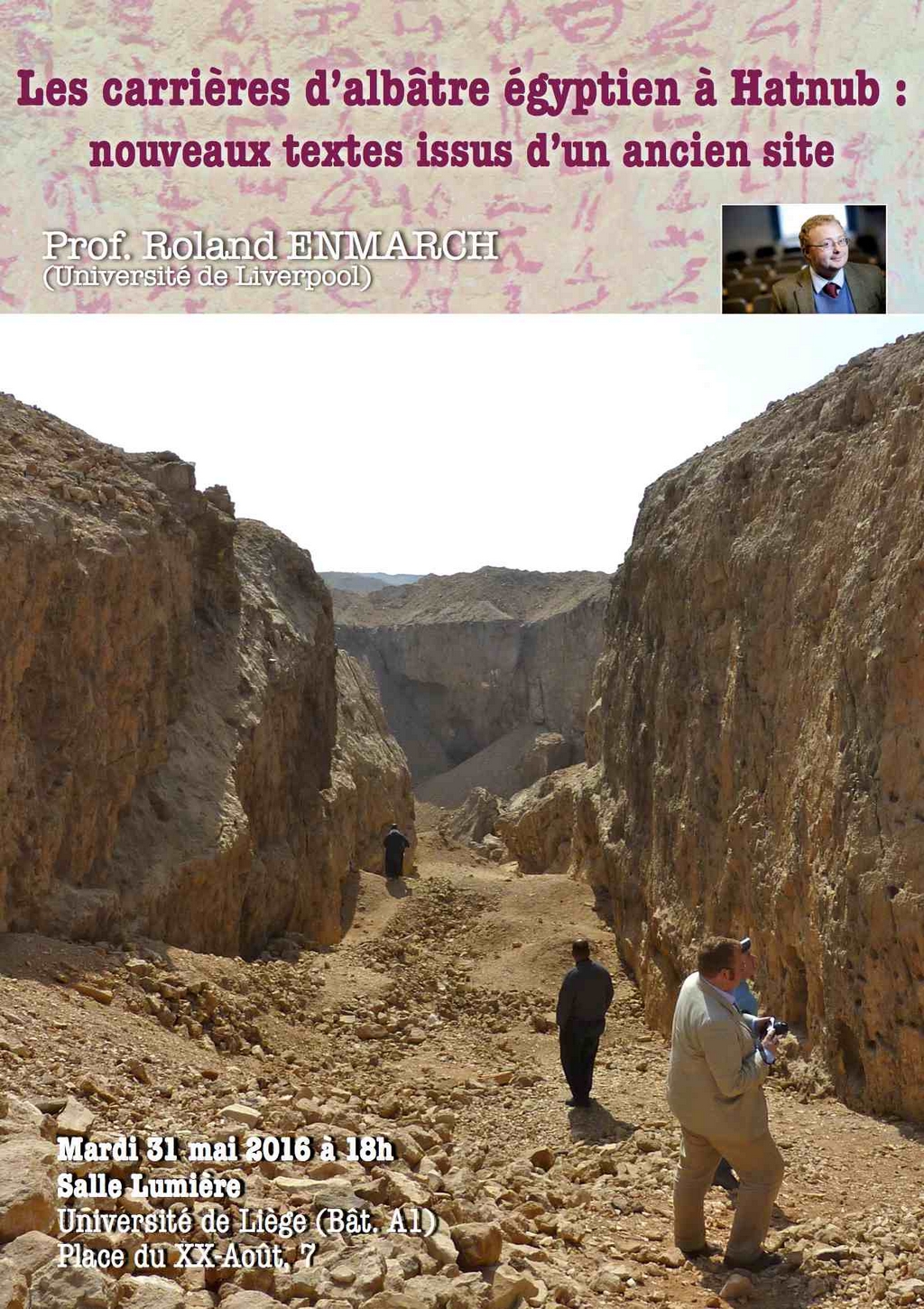
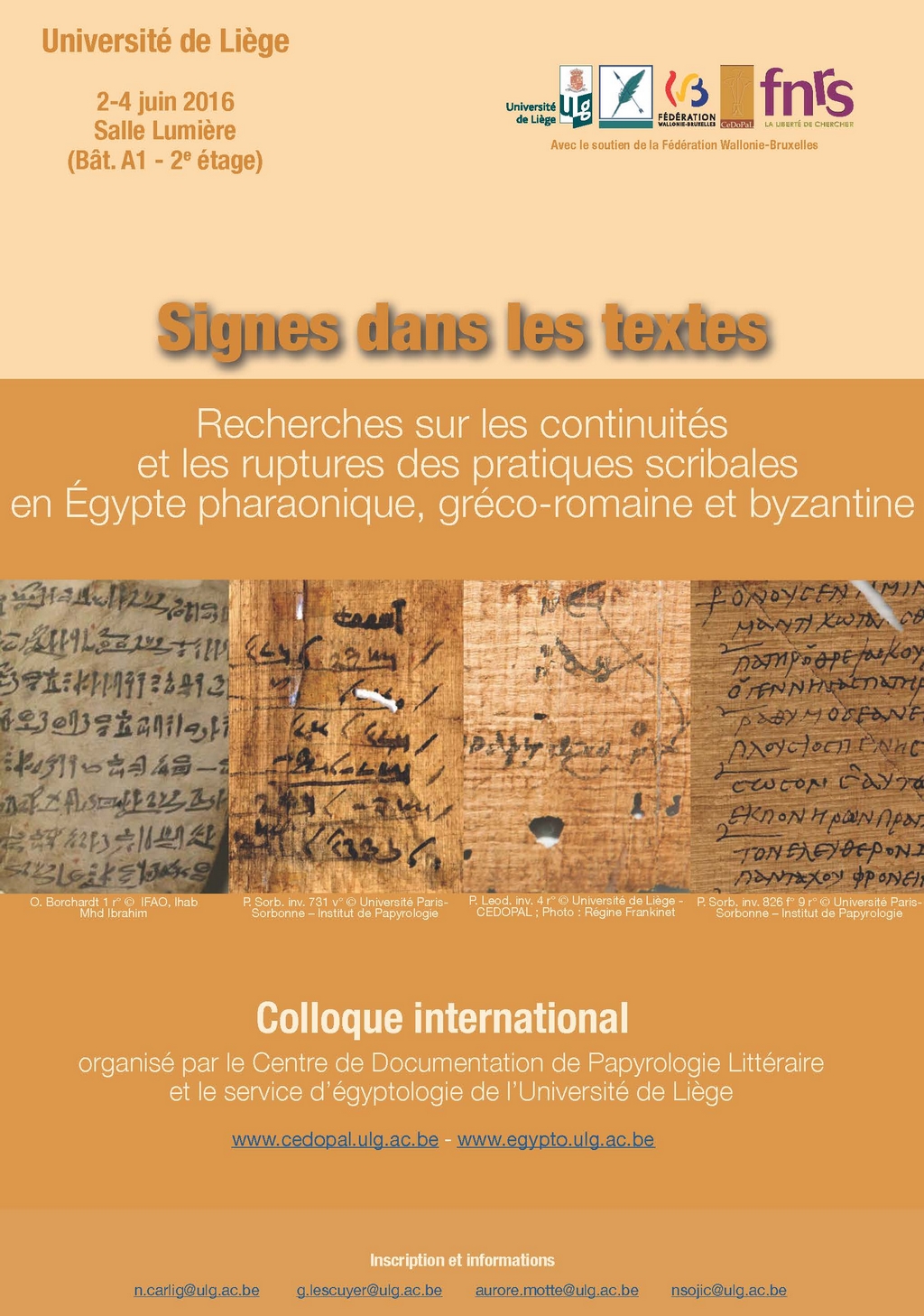
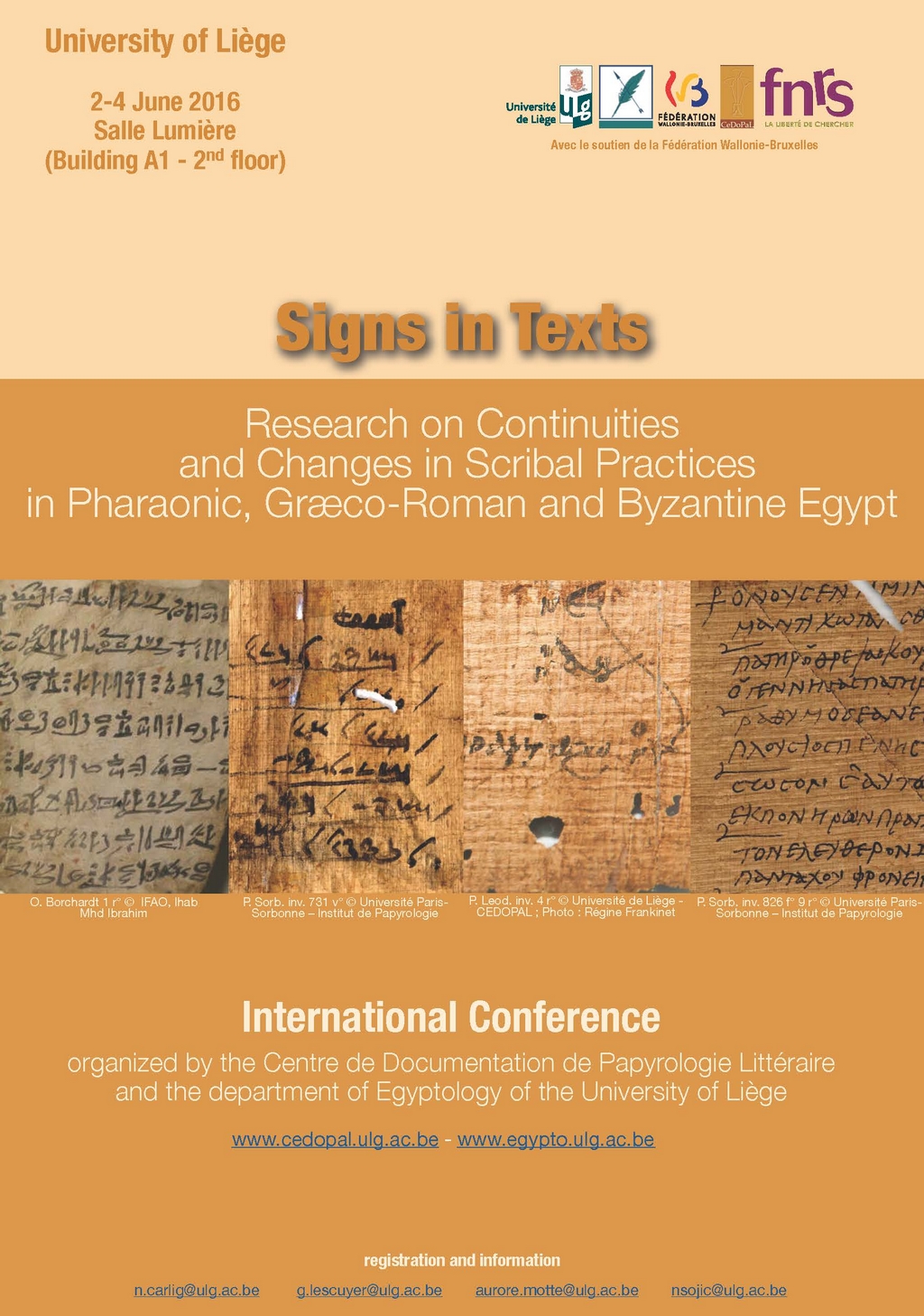
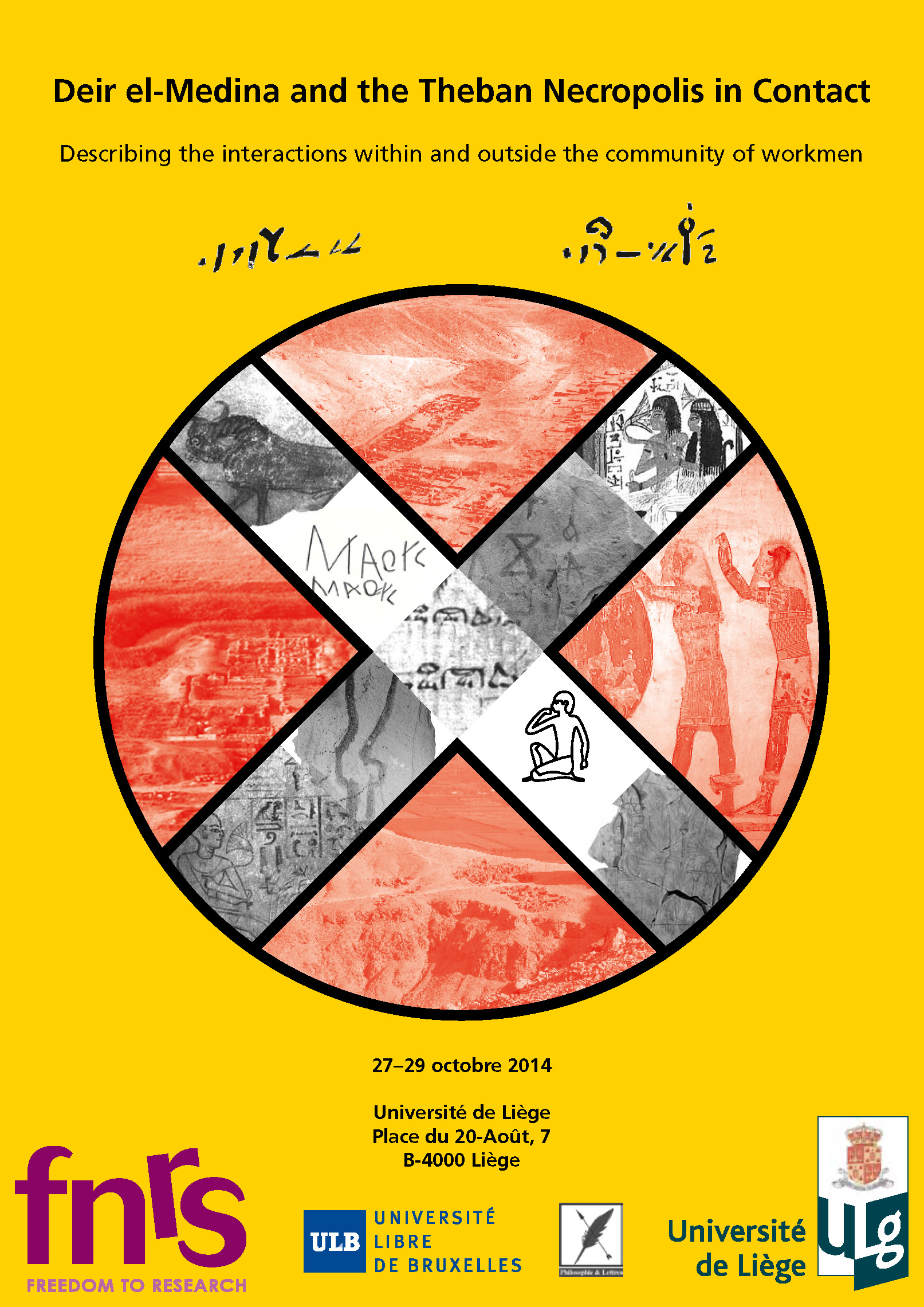

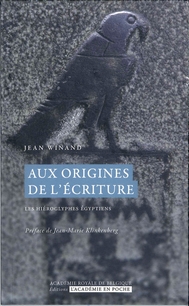
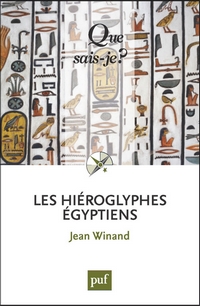
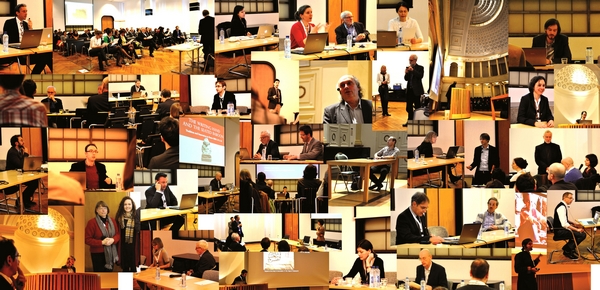
productive Traditions14s_small.jpg)
